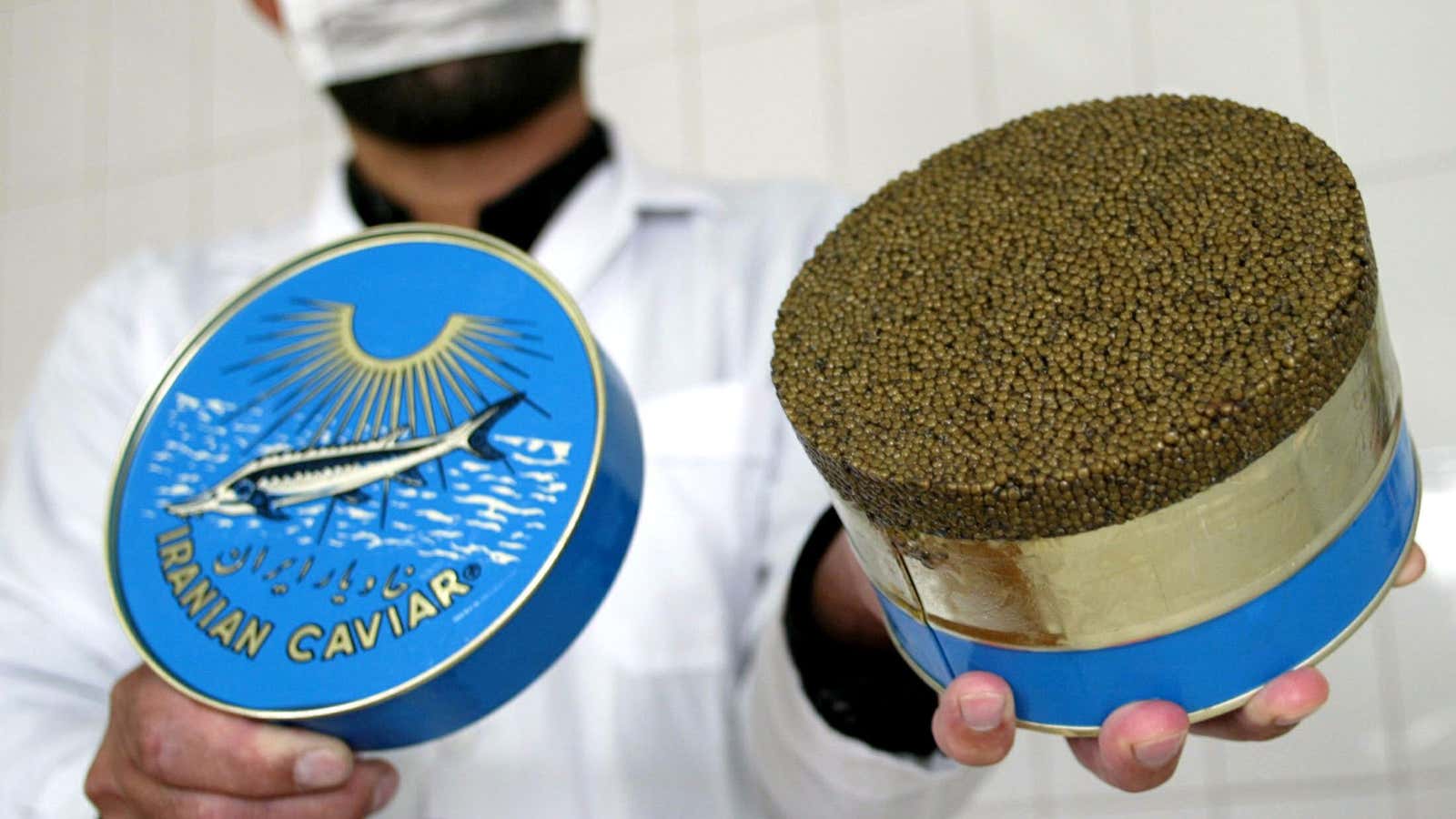Now that the end of Iranian sanctions by the West are close at hand, the world is hungry for a piece of Iran. That goes for its oil sector, its military contracts, and also its caviar.
Caviar, the salt-cured eggs of the sturgeon fish, typically enjoyed cold with champagne or chilled vodka, traditionally hails from Iran’s corner of the world—the word “caviar” is of Persian origin. Thanks to its position on the the Caspian sea, Iran has been one of the world’s largest producers of the luxury foodstuff. A 30-gram tin of quality caviar retails for about $70—the finest can set you back closer to $150.
The deal Iran made with the global powers to cease developing nuclear weapons will end many of the economic sanctions arrayed against it, putting its caviar back on the global market. Even the US, which is not rolling back the majority of its trade sanctions, has a specific exception for caviar imports.
But it’s not clear that the Iranian stuff will find much room in the US market, which imported 5,776 kilograms of caviar worth $7.6 million last year.
“Ten years ago, I would tell you we get all our caviar from Russia and Iran,” says Alexandre Petrossian, the US executive for his family’s eponymous caviar trading company. “Right now, it’s very different.”
Geopolitics have surprisingly little to do with it; it’s more a matter of technique. ”There’s no more wild caviar available in the US,” Petrossian tells Quartz. “Everything has to be farm raised.”
That’s because over-fishing of the sturgeon in its traditional habitat put the fish on the brink of extinction. Activists pressured governments to promote caviar from farm-raised sturgeon instead, and that has made a regional delicacy a global manufacturing problem to be solved.
You can see how imports to the US have changed since the early 1990s through 2014:
That bump in imports from China? That’s from Chinese sturgeon farms taking advantage of the opportunity to produce a luxury good in an alternative way. Even Israel has gotten in the act, starting sturgeon farms and marketing them to credulous journalists as a way to strike back at Iranian aggression.
The wild stuff may sound more authentic, but the reality, Petrossian says, is that farmed caviar often results in a more consistent product than harvesting eggs from wild-caught fish.
That doesn’t mean Petrossian isn’t interested in Iranian caviar, which is still prized by connoisseurs. The company has more than a little history with the region: Petrossian was founded two generations ago by Alexandre’s grandfather and great uncle, who were born in Iran after their family fled the Armenian genocide. The family later went to Russia, only to flee to Paris during the Bolshevik revolution. Company lore has it that the brothers partnered with hotel impresario Cesar Ritz to popularize the Caspian delicacy in western Europe.
“We are very specific in the way we do things; if everything is right, we would definitely be interested in working with [Iranian producers],” Alexandre Petrossian says. ”We have someone that works for us now more than 20 years whose only job is to go around the farms and check the quality of the fish, the feed, the water, make sure the production is what we want; we are kind of control freaks. … We will stick to our guns and serve the best caviar possible, regardless of where it is from.”
Right now, that includes California, where a farm produces one of the Petrossians’ most popular varieties, Transmontanus. Farms in Bulgaria, Italy, and China also figure into the mix.
But Iran has been developing sturgeon farms, too. And with the availability of new customers and capital from around the world—part of a major resurgence in business activity expected in the wake of the nuclear deal (paywall)—these efforts could increase, and bring Iranian fish eggs back onto the global scene.
Petrossian offers this sage advice for anyone purchasing caviar, of any provenance: ”Always, always try the caviar that you are buying,” he says. “Open the thing you are actually buying, the exact same thing; you want to try a couple eggs, just to make sure that what you bought is something that you like. If they don’t let you try it, change. Go somewhere else.”
Otherwise, you risk an outcome that no doubt was on the mind of international diplomats during the fraught negotiations over Iran’s nuclear capabilities.
“The oldest trick in the book,” says Petrossian, “is the bait and switch.”
